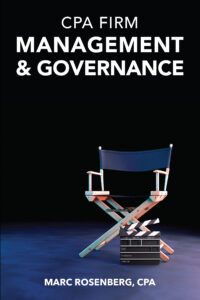Successful CPA Firms: The Common Denominators
 Our good friends, Kelly and Mike Platt of INSIDE Public Accounting were kind enough to interview me for their fabulous newsletter. They asked my advice on leading-edge practice management. Highlights:
Our good friends, Kelly and Mike Platt of INSIDE Public Accounting were kind enough to interview me for their fabulous newsletter. They asked my advice on leading-edge practice management. Highlights:
What are the common denominators of successful firms?
- Growth, marketing and active practice development. Revenue growth energizes the firm, creates continuous new opportunities for staff and prevents stagnation. Successful firms practice ABS: Always be selling.
- Developing, engaging and retaining staff. Can anyone possible disagree with this?
- Leverage: partners must be delegators, not doers, working ON the business, not IN it. It’s more important what partners do with their non-billable time than their billable time.
- Management and leadership, which make all of the above happen.
Can you offer three pieces of advice to MPs?
Take this perspective every day when you wake up and be tenacious about it.
- Make the firm your #1 client. To walk this talk, MPs must dramatically reduce their client duties to create the time and mental focus to truly make the firm their #1 activity.
- MP’s must challenge themselves and their partners: “What does this firm need to be tomorrow that it is not today? Heifetz said: “identifying challenges and focusing people’s attention on those challenges is first and foremost.” Ensure that the firm focuses on growth. MPs don’t have to be rainmakers. But they must make sure the firm grows continuously.
- Be highly effective at attracting, mentoring, training and developing a great staff.
CPA Firm Management & Governance is a must-read for partners who want to run their firm like a real business. The book addresses ►Best Practices for managing and structuring the leadership group, ►how decisions get made, ►voting, ►how the Board functions, ►the role and expectation of a partner, ►the Managing Partner, ►organization structures for various firm sizes, ►job descriptions of key management positions, ►partner accountability and other issues.
Partner accountability remains elusive at many accounting firms. Why is it so difficult and how can firms make progress in this area?
90% of firms under $15M have very little partner accountability. Larger firms are more successful at it, but accountability is difficult because:
- Partners feel that once they become partner, they have the inalienable right to do whatever they want, whenever they want. This misguided and destructive mentality will continue unless someone changes it.
- Highly productive partners are often given a waiver on accountability because the other partners are not willing to jeopardize their own livelihood by meting out consequences to transgressors.
- CPA firm partners are conflict-avoiders. They ignore partner transgressions, hoping they will go away. But sweeping problems under the carpet only creates lumps.
Firms establish partner accountability in many ways, some of which are:
- The MP holds all partners accountable for their performance and behavior.
- Making it clear what is expected of each partner and what they will be held accountable for.
- Peer pressure.
- Compensation, which, contrary to what many firms think, is not the best way.

CPA Firm Management & Governance
Best practices for managing and structuring the leadership group; descriptions of both partnership and corporate styles; role of the managing partner and firm administrator; decision making; voting; the role of a partner and how the organization changes as the firm grows.
Learn More